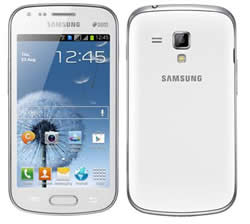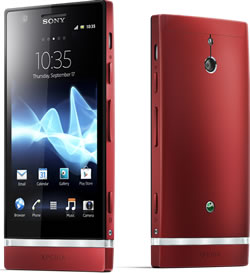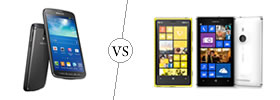Difference between Samsung Galaxy S Duos and Sony Xperia P
Key difference: Samsung Galaxy S Duos is a dual-SIM phone that was launched in September 2012. The phone comes with a 4-inch TFT capacitive touchscreen, with approximately 233 ppi density. The device comes with Samsung’s TouchWiz UI on Android 4.0.4 ICS. Sony Xperia P features a 4-inch TFT touch screen that allows up to 4-touch capabilities. The screen is scratch resistant and has a shatter proof coating. The touch screen provides approximately 275 ppi pixel density along with WhiteMagic technology, which adds an extra white pixel with the already present red, blue and green.

Initially smartphones would come in two categories, the no-nonsense simple phone and the extravagant phone with loads of features and a high price tag. However, now there are many people who expect different things from their phone, including features but a lesser price tag, durability, more battery power, etc. This has enabled smartphone manufacturers to offer an array of different phones for the different types of customers. Samsung announced the Galaxy S Duos as an option aimed for people that require double SIM capability, eliminating the need for carrying two separate phones. The phone was launched in September 2012.
At first glance, the Samsung Galaxy S Duos bears heavy resemblance to the company’s flagship phone, the Samsung Galaxy S3. However, looking past the basic form of the phone and picking it up; the user can realize the reason for such a small price tag. The phone is a cheaper version of its big brother, with a lesser quality plastic and some downgraded features. However, let’s not label it as of yet, as it does come with some good specs. The 4-inch TFT capacitive touchscreen, with approximately 233 ppi density, is pretty decent with good contrast and colors but it is too reflective under sunlight, making it a bit difficult to use outdoors without squinting or trying to cover the screen.
The phone itself is easy to hold and handle, making it sleek and small enough to slip into jeans pockets or a small purse when on the go. The 120 grams of weight also ensures that the phone does put that much pressure on the hands when holding the device for longer periods of time. The top of the device houses only the 3.55 mm jack, while the bottom only has the USB/charging port. The right side of the device holds the power button on the top right hand and the microSD card slot. The left side of the device only holds the volume rocker, a bit hard to reach, if a person is used to having it on the right. On the front, the device has the home button that is surrounded by capacitive more options and a back button.
The device comes with Samsung’s TouchWiz UI on Android 4.0.4 ICS. Again, the UI is a toned down version of the one found on the S3. The device lacks the ripples effect and the water-drop sound and has four customizable shortcut buttons on the bottom of the lockscreen that can directly take you to apps such as missed phone calls when unlocking the device. The device allows users to add/remove apps from the homescreen as well as add/remove panels similar to other versions of Android.
The device is powered by a 1 GHz Cortex-A5, with about 786 MB of RAM. The RAM is a slight upgrade to the 512 MB available on other phones, but it still isn’t that great when trying to run dual-SIM, resulting in some lagging during operation. The dual-SIM capability and standby allows both SIMs to be operational at the same time. The device comes with a 5 MP rear camera for taking photos and recording videos. The rear camera is pretty decent in terms of taking photos. The images have pleasing colors and a good dynamic range, but the photos are a bit grainy. The phone also comes with features such as smile detection, geo-tagging, Share shot, effects and panorama mode. The S Duos also houses a VGA (0.3 MP) front camera that is as okay, nothing much to talk about. The phone can also capture videos in VGA resolution at 30fps.
The S Duos comes with a decent removable LI-Ion 1500 mAh battery, that according to the company provides a talk time of 770 minutes in 2G and 520 minutes in 3G, along with a standby time of 570 hours in 2G and 470 hours in 3G. The phone does not come with the same amount of features as available in Galaxy S3, but with the price tag of this device, it is still something. The main reason for purchasing the phone would still be the dual-SIM capability, while in other countries where dual-SIM options are more common, the phone may not fare as well.
 Sony is a prominent technology company and is known best for its electronics such as phones, TVs, gaming systems, etc. The constant dynamic nature of technology ensures that we always have a better and more forward technology than the one we had a month ago. The price of this dynamic technology is also high, the constant updating of technology requires people have that much cash on hand. However, many companies such as Sony know that not many people have that much cash on hand for disposal, hence has launched mid-range phones such as Xperia P that allows the people to experience the best of both worlds: technology and affordable pricing. The Xperia P was launched in May 2012 and continues to be a major player in the market.
Sony is a prominent technology company and is known best for its electronics such as phones, TVs, gaming systems, etc. The constant dynamic nature of technology ensures that we always have a better and more forward technology than the one we had a month ago. The price of this dynamic technology is also high, the constant updating of technology requires people have that much cash on hand. However, many companies such as Sony know that not many people have that much cash on hand for disposal, hence has launched mid-range phones such as Xperia P that allows the people to experience the best of both worlds: technology and affordable pricing. The Xperia P was launched in May 2012 and continues to be a major player in the market.
Sony Xperia P features a 4-inch TFT touch screen that allows up to 4-touch capabilities. The screen is scratch resistant and has a shatter proof coating, allowing the screen to endure minor scratches and everyday scuffs without sacrificing on the quality. The touch screen provides approximately 275 ppi pixel density, though not the best ppi compared to the heavy contenders but the quality of the screen is not sacrificed. This is mostly because of the company’s WhiteMagic technology, which adds an extra white pixel with the already present red, blue and green. The extra pixel generates a higher level of brightness that does not cloud the phone when using it under direct sunlight.
The phone is a little bulky in nature, but it is easy to become accustomed to when holding it for longer periods of time. The phone is also a little heavier compared to similar phones, but again not something that lets the user forget of the other great features of the phone. The phone is encased in a plastic chassis, which is quite smooth to hold but is also prone to many visible scratches and chips. The device has a clear plastic border on the front that also doubles as a cover for the antenna. Above the plastic border reside the Home button, back button and Menu button. The power button, the volume rocker and the physical camera button is on the right side of the device, while the left sides hosts a variety of ports including the SIM card slot.
Under the hood, the device is powered by 1 GHz Dual-core processor and hosts the company’s Timescape UI. The user interface is quite smooth and does not glitch when shifting between the screens and the apps. The device runs on 1 GB RAM and comes with an internal storage capacity of 16 GB. Of the 16 GB, only 13 GB is available to the user and it is not expandable. The device houses an 8 MP Autofocus rear camera and a VGA (0.3 MP) front camera, which is a little bit of a letdown. The Exmor R technology ensures that the rear camera provides sharp, clear images, while the front camera does not live up to the same quality. Though initially powered by Android v2.3, the device is now available with Android v4.0, which no status as of yet for v4.1 upgrades. The phone also comes with additional features such as Motion gaming, MobiSystems’ OfficeSuite 5, Wi-Fi hotspot, DLNA, USB On-the-go, Native USB tethering and NFC capabilities. The Xperia P houses a non-removable 1305 mAh battery, which provides a decent battery life and lasts almost a day. With the amount of features that are offered with the phone, the price tag is expected to be quite high; however, the price is quite affordable and will not make that much of a dent in the user’s pocket.
The information for the detailed table about the two devices has been taken from Samsung website, Sony Mobile website, expertreviews.co.uk and GSMArena.com
|
|
Samsung Galaxy S Duos |
Sony Xperia P |
|
Launch Date |
September 2012 |
May 2012 |
|
Company |
Samsung |
Sony |
|
Size |
121.5 x 63.1 x 10.5 mm |
122 x 59.5 x 10.5 mm |
|
Display |
4.0-inch TFT capacitive touchscreen |
4-inch scratch-resistant TFT touchscreen |
|
Screen |
480 x 800 pixels (~233 ppi pixel density) 16M colors |
960 x 540 pixels (~275 ppi pixel density), 16 million colors |
|
Protection |
No |
Scratch-resistant, shatter proof sheet on mineral glass |
|
Weight |
120 grams |
120 grams |
|
2G Network |
GSM 850 / 900 / 1800 / 1900 - SIM 1 & SIM 2 |
GSM GPRS/EDGE 850, 900, 1800, 1900 |
|
3G Network |
HSDPA 900 / 2100 - SIM 1 & SIM 2 |
UMTS HSPA 850, 900, 1900, 2100 |
|
4G Network |
N/A |
N/A |
|
GUI |
TouchWiz 4.0 UI |
Timescape UI |
|
CPU speed |
1 GHz Cortex-A5 |
1 GHz Dual core processor |
|
GPU |
Adreno 200 |
Adreno 205 |
|
OS |
Android OS v4.0 (Ice Cream Sandwich) |
Android OS, v2.3 (Gingerbread), v4.0 (Ice Cream Sandwich), planned upgrade to v4.1 (Jelly Bean) |
|
Chipset |
Qualcomm MSM7227A Snapdragon |
NovaThor U8500 |
|
RAM |
768 MB |
1GB |
|
SIM Size |
miniSIM (Dual-SIM handset) |
microSIM |
|
Internal Memory |
4 GB (1.8 GB available to the user) |
16 GB (13 GB accessible to the user) |
|
Expandable Memory |
Up to 32 GB |
N/A |
|
Sensors |
Accelerometer, Geo-magnetic, Proximity Sensor |
Accelerometer, Proximity sensor, Ambient light sensor, Magnetometer and Gyroscope |
|
Connectivity |
GSM; EDGE/GPRS (850/900/1,800/1,900MHz); HSDPA 7.2; Wi-Fi 802.11b/g/n 2.4GHz; Wi-Fi Direct; Bluetooth |
USB High speed 2.0 and Micro USB support, WiFi and WiFi Hotspot functionality, HDMI Support, DLNA Certified, Synchronisation via Exchange ActiveSync, Google Sync and Facebook, aGPS, WebKit web browser with Pan & zoom, Bluetooth technology, Native USB tethering and NFC. |
|
Data |
GPRS, EDGE, WLAN, Bluetooth, USB. |
GPRS, EDGE, WLAN, Bluetooth, NFC, USB. |
|
Speed |
HSDPA, 7.2 Mbps; HSUPA, 5.76 Mbps |
GSM GPRS Up to 100 kbps; GSM EDGE Up to 296 kbps; UMTS HSPA cat 6 (upload) Up to 5.6 Mbps; UMTS HSPA cat 10(download) Up to 14.4 Mbps |
|
WLAN |
Wi-Fi 802.11 b/g/n, Wi-Fi hotspot |
Wi-Fi 802.11 b/g/n, Wi-Fi hotspot, DLNA |
|
Bluetooth |
Bluetooth v3.0 with A2DP |
Bluetooth v2.1 with A2DP, EDR |
|
USB |
microUSB v2.0 |
microUSB v2.0, USB On-the-go |
|
Primary Camera |
5 MP CMOS rear camera |
8 MP 3264x2448 pixels rear camera |
|
Secondary Camera |
VGA CMOS front camera |
VGA front camera |
|
Video |
VGA@30fps |
HD video recording (1080p) |
|
Camera Features |
|
|
|
Sound Enhancement |
No |
xLOUD Experience Clear bass and clear stereo |
|
Audio supported formats |
AAC, AAC+, AMR, AMR-NB, AMR-WB, eAAC+, I-Melody, IMY, M4A, MIDI, MP3, OGG, SP-Midi, WAV, WMA |
MP3, 3GPP, MP4, SMF, WAV, OTA, Ogg vorbis |
|
Video supported formats |
MPEG4, H.263, H.264 |
3GPP, MP4 |
|
Battery Capacity |
Removable Li-Ion 1500 mAh battery |
Non-removable Li-Ion 1305 mAh battery |
|
Talk time |
2G: 770 minutes 3G: 520 minutes |
2G: 6 hours 3G: 5 hours |
|
Stand-by |
2G: 570 hours 3G: 470 hours |
2G: 470 hours 3G: 475 hours |
|
Available Colors |
White, Black, La Fleur |
Black, Silver, Red |
|
Messaging |
SMS (threaded view), MMS, Email, Push Email |
SMS (threaded view), MMS, Email, IM, Push Email |
|
Browser |
HTML, Adobe Flash Lite |
HTML5, Adobe Flash |
|
Radio |
Stereo FM radio with RDS |
FM Radio with RDS |
|
GPS |
GPS with A-GPS support |
GPS with A-GPS support |
|
Java |
Java via Java MIDP emulator |
Java via Java MIDP emulator |
|
Additional Features |
|
|
Image Courtesy: samsung.com, sonymobile.com









Add new comment